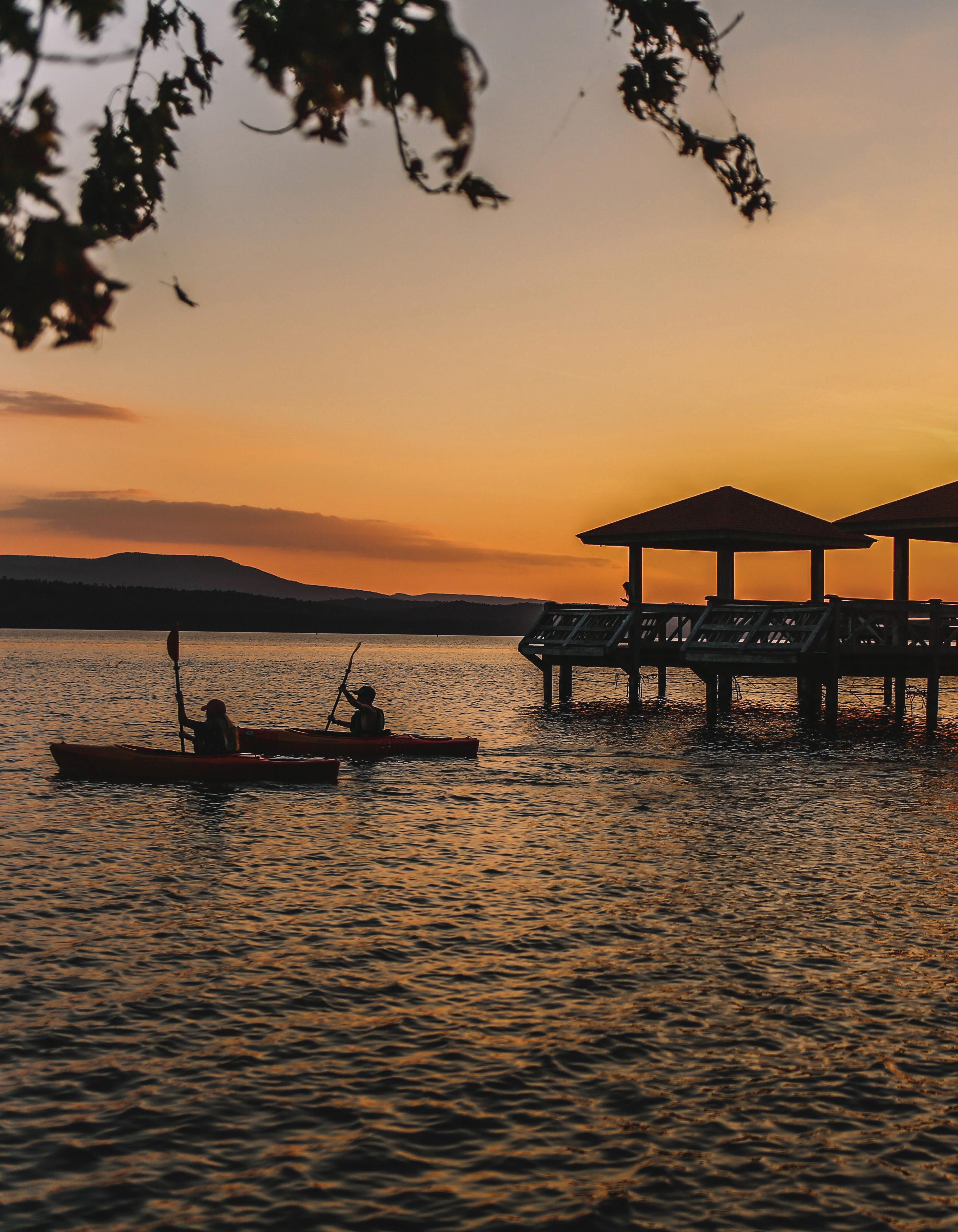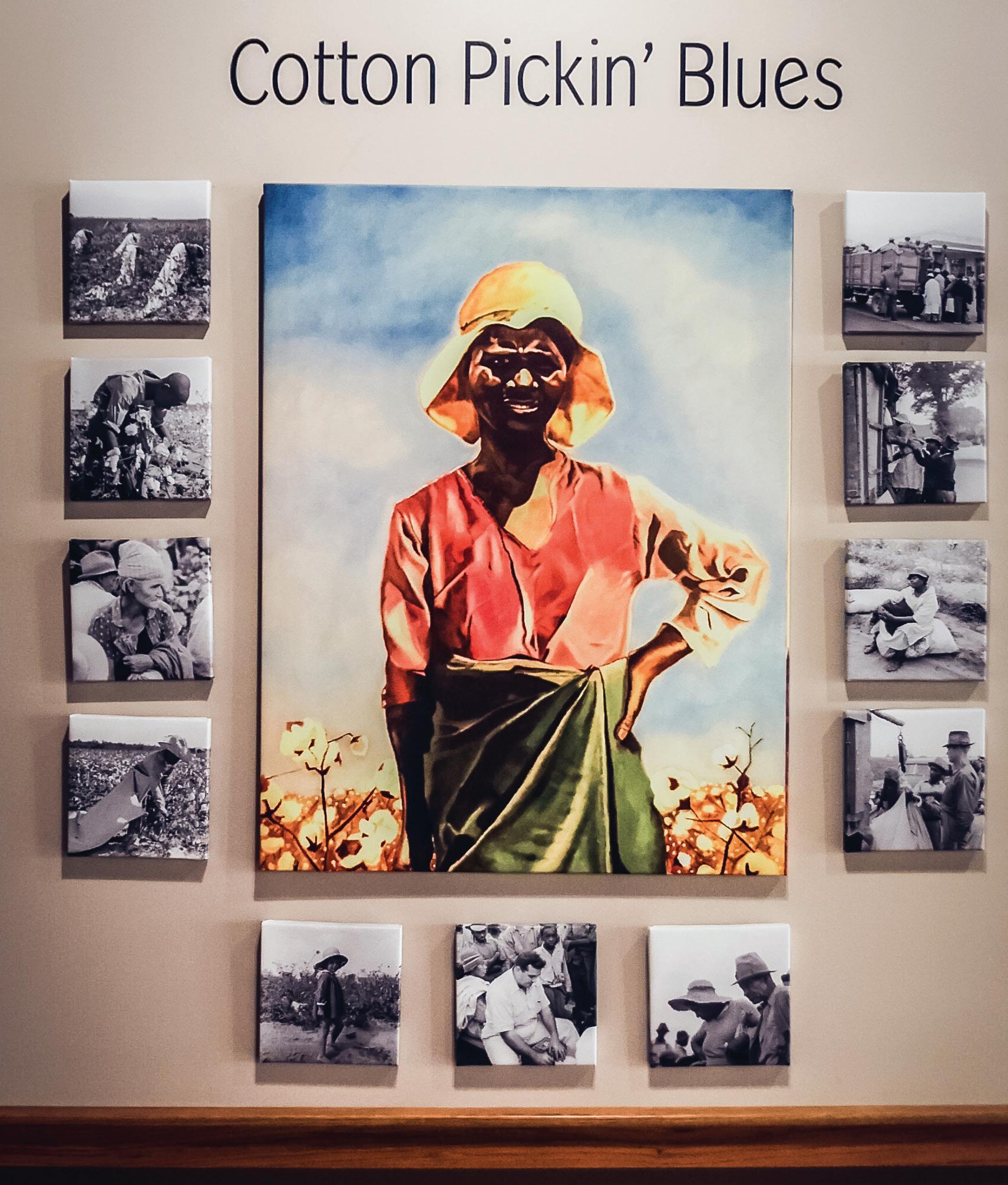
21 minute read
Quick Getaways
GASTON’S WHITE RIVER RESORT
Summer weekends are full of world-class fishing, Ozark mountain beauty and award-winning dining when you stay in your riverside cabin at Gaston’s. When you’re not hooking a big trout, miles of hiking and biking trails call you to adventure. Meanwhile, Gaston’s acclaimed waterfront restaurant is cooking up specials all day, from delicious bistro-style sandwiches to steak, seafood and pasta. The chef will even prepare your fresh catch for you while you enjoy one of our premier wines or craft beers.
Now you can top off your first-class stay with music outdoors under the stars. At Friday Night Live in nearby Mountain Home, you can relax to the tunes of popular regional artists in country and classic rock. Join in on the kick-off of the series with a big Gaston’s Summer Launch Party on June 4, featuring Patient Eyes and other special musical guests. Catch more great music on June 18, July 9 and 23, and August 13 and 27. After the music, you can come back for a great night’s sleep and morning coffee on your porch, only steps away from the scenic White River.
Start planning your perfect weekend overflowing with fun and music!
LITTLE ROCK ZOO

It’s going to be a “paw-fully” exciting summer at the Little Rock Zoo, thanks to the incredible efforts by the staff, leadership and volunteers who have been working around the clock to make up for the lost time last year.
For starters, there is a new furry friend in town, Ambesoli, who is the newest member of the Zoo’s lion pride. That’s in addition to the brand new habitats constructed for the Angolan colobus and serval cat, which were unveiled this spring.
Speaking of new friends, the Zoo also just announced that Andazi, a black rhino, is pregnant. She and the father, Johari, expect to share their new bundle of joy with the world in November.
With plenty of this excitement in the air, the Zoo is primed to put on a show for the newest members of the family (and you). The can’t-miss event of the summer is the Tails and Tunes series. Every Thursday night in June the Zoo will stay open until 9 p.m. for some family fun after dark — like live music, food trucks, wine and beer vendors, and yard games.
Starting Memorial Day weekend, the Zoo’s Animal Ambassador shows will return to the Civitan Amphitheater and recur every Saturday and Sunday at 11 a.m. through Labor Day weekend. (A little bird told us that Griffin, the new eagle, will debut for this series.) Breakfast With a Twist kicked off in May as well, running one Saturday every month from May to September. This is an event where you can come to the Zoo, enjoy a hot breakfast, chat with one of the zookeepers about the featured animal and then end the morning creating art of the featured animal with Painting With A Twist staff to guide you.
If you still have an appetite after all that, then there’s also the news that Café Africa is now available for mobile ordering.
Add to the mix that ZooFari camps returned on May 31, the train and carousel have officially reopened, and it’s clear why the Little Rock Zoo is one of the best places to get wild this summer.
littlerockzoo.com • 1 Zoo Drive, Little Rock
MOUNTAIN HARBOR RESORT & SPA

On the largest lake in Arkansas, you can rent a boat and explore hundreds of islands and coves, catch your limit at one of the best fishing spots in the nation, or find adventure when you hike or bike the EPIC LOViT trail. Mountain Harbor Resort & Spa is the ideal haven for a Lake Ouachita weekend getaway.
Stay next to the water in a luxury cabin and watch the glorious sunset from the deck. Enjoy a room by the lodge close to one of three sparkling swimming pools. Get on the lake from one of the largest inland marinas in the country, where you can try pontoon boats, houseboats, guided fishing trips, jet skis, scuba diving and more.
Then grab one of the famous Harbor Burgers and a dessert in the warm atmosphere of its popular Harbor Lodge restaurant.
Your Harbor For Healing — unwind with a massage with heated Arkansas quartz crystals, or try a facial, pedicure or body treatment. Turtle Cove Spa offers pure relaxation that has earned it the honor of No. 1 spa in Arkansas from Spas of America.
There are many ways to escape at Mountain Harbor.
CENTRAL ARKANSAS LIBRARY SYSTEM

Books are a world of adventure, and with Central Arkansas Library System (CALS), you and your kids can go just about anywhere. CALS is geared up for a summer packed with adventure, both near and far. Set sail with a book in the comfort of the Level 4 teen area, tour the garden or storywalk at Children’s Library, play games at your favorite branch on one of the many computers or tablets, or take a hotspot home to continue the fun on your own time. Children can even pick up meals for lunch or dinner. The library is open and ready to help you.
Join the Summer Reading Club for prizes, crafts and a calendar packed with events for all ages. This year’s theme is “Tails & Tales” and explores stories of animals, dragons, and even mermaids! Throughout June and July, CALS will be offering grab-and-go activities, socially distanced in-person events, and virtual events taking place on Facebook, YouTube, Zoom and other digital platforms. Some events will be live; others will be recorded. Even if your summer will be spent at home, you can still have an adventure with CALS.
Visit one of its many branches to pick up weekly grab-and-go bags, and for more information about CALS and to register for Summer Reading Club, visit cals.org/summer-reading-club.
Nestled on 459 acres just south of Eureka Springs is an ethical animal tourism destination offering a taste of Africa in the Ozarks. Turpentine Creek Wildlife Refuge (TCWR) is home and haven to a variety of exotic and native animals. Accredited by the Global Federation of Animal Sanctuaries (GFAS), TCWR’s mission is to provide refuge for abandoned, abused and neglected big cats with an emphasis on tigers, lions, leopards and cougars.
All the animals that call the Refuge home have been rescued. Each resident has a unique story to tell. Guests enjoy scheduled tours led by knowledgeable staff members who give those stories a voice. A visit can be made even more memorable by ordering a Big Cat Callout — special enrichment given to the cat or bear of your choice with your own unique message. The big cats have even assisted in wedding proposals! Memberships to the Refuge are also available.
For an exceptional experience, the Refuge offers overnight accommodations. From adult-only Safari Lodges with access to a fire pit and hot tub, to the extremely popular family suites, the treehouse and even a pair of glamping tents, there is an option sure to meet every taste. There are RV sites if you prefer to bring your road home with you. Plan your visit today to see why Turpentine Creek Wildlife Refuge has been voted a Top Three Family Attraction in the Natural State! For more information about educational programs, memberships, lodging and tours visit tcwr.org.
239 Turpentine Creek Lane, Eureka Springs • (479) 253-5841 • TCWR.org


DISCOVER RUSSELLVILLE
A blend of yesteryear’s charm and modern convenience, Russellville is a small city with a big heart. Art galleries, antique markets and enticing eateries populate the historic downtown area as music from local talent fills the air. Land-loving outdoor enthusiasts will find gritty adventure in nearby public wildlands and parks. Water enthusiasts can boat, ski and fish on Lake Dardanelle. Russellville sits conveniently at the crossroads of Interstate 40 and scenic Highway 7 with interesting and fun opportunities in every direction.
Anchor Down:
Planning Your Cove Time
By Dustin Jayroe
To be a state so locked by land, Arkansas has quite a share of liquid dividends. Freshwater flows in superfluity across our lands — from the highs of the Ozarks to the lows of the Delta — cutting and carving the very fabric of what makes the Natural State.
That’s a romantic way of looking at it, at least. For most of us Joes, a state so strewn with lakes, rivers, ponds, creeks and spillways provides an almost endless supply of recreational opportunities for ourselves and our loved ones. We can float and boat, fish and swim, or simply sit “on the dock of the bay, watchin’ the tide roll away.”
This month, as the season of summer officially descends, a safe wager would be that most Arkansans have some form of water-related plans already on the agenda. An even safer bet is that most of that will be time spent on one of our great lakes — skiing behind a speedboat or unwinding on a pontoon. On your way, pack plenty of tubes and floaties, but don’t leave behind the rod and reel.
Test Line for Cove Time
One of the keys to a successful day on the lake is mapping out your time on the water. Naturally, some of it will be spent cruising through channels and open spaces, but at some point you’ll settle into one of the lake’s dead ends and drop anchor. (Tip: If there’s a specific cove you’re after, get there early. As the day wears on, many folks will dock into the same idea.)
The best part about cove time is that, well, there’s no time. Seconds can aimlessly drift into minutes and hours, just as you casually float along the surface. But we land-dwellers don’t necessarily need to be in the water the whole time. Some might take the opportunity to sunbathe topside, but this is also the perfect time to engage in America’s real favorite pastime — fishing.
Not only is cove fishing good fun for the whole family in between dips in the water, but it can also be among the most rewarding. Absent the speeding boats of the busier parts of the lake, coves are peaceful and quiet — above the surface, at least. Below, coves are bustling with all kinds of aquatic life.
Whether it’s Bassmaster, Field & Stream, American Angler or any other fishing-related source worth its salt, you’ll likely find similar advice wherever you look — fish the coves. Some go so far as to refer to coves as “fish pockets.” That’s because, in addition to the solitude, baitfish begin to school en masse in shallow water once spring rolls around; by summer, it’s an off-the-bank buffet. Once that occurs, the other dominos follow suit — baitfish, small fish, medium fish and big fish, each playing its role in the circle of life. No matter which of those varieties you’re after, your luck couldn’t be much better at catching some than in a cove.
Slip on a bobber to delicately dangle a hook baited with a worm or cricket, and a cove is almost sure to deliver some bream for your haul. Secure a minnow to that hook and you might interest a rock bass or smallmouth. Or you can get busy with a jig, spoon or spinnerbait to try your hand at a largemouth. Sink a bait to the bottom (depending on the depth of the cove) and you might even snag a catfish or two.
No matter what kind of luck you run into, making the time to cast a few lines during your time in a cove is sure to take anyone’s day on the lake to the next level. No matter how big or small your family, making memories is what it’s all about. And it doesn’t get much better than quality time in one of nature’s cul-de-sacs.


The Sound of OUR TOWN:
Pine Bluff Paved by Music
By Dwain Hebda / Photos by Ebony Blevins

It’s hard to stump Jimmy Cunningham Jr. when the topic is the Arkansas Delta and especially on his beloved hometown of Pine Bluff.
Cunningham, head of the Delta Rhythm & Bayous Alliance, knows this place like most people know their own heartbeat. The people, the culture, the tragedy and the triumph, all of it Cunningham knows by rote, like the lines of the Pledge of Allegiance or the words to “Amazing Grace” or the idealized version of humanity that lies somewhere in between.
But asked what makes it different, what you hear rumbling up from the Arkansas flats that chimes differently than, say, Tupelo or Clarksdale, and Cunningham’s resplendent baritone — round, deep and lush as a whiskey barrel — falls silent in thought.
“That’s a very good question,” he says at last. “One of the differences between the Arkansas Delta and the Mississippi Delta is that even though both regions had large populations of African Americans, on the Mississippi side the entire area was predominantly African American while on the Arkansas side it wasn’t. And if you went to the Upper Delta, you got places right on the river where it’s an even different mix of elements, and you get a different mix of art.”
Cunningham unleashes a broad smile at this thought, then a dram of liquid basso laughter pours out.
“It’s kind of blues-plus,” he says. “You know, we have some different dynamics and some different things going on that have impacted our music, and they kind of make us different.”
Of all the geographic regions that comprise Arkansas’ unique physical landscape, the Delta is easily the most enigmatic. On the one hand, it’s by far the harshest, most economically disadvantaged and most troubled, both in retrospect and present tense. On every measure — quality of education, median income, access to health care, addiction rates — Delta communities simmer at the bottom of the societal pot, causing population to gurgle downward, flowing out in search of opportunity.
On the other hand, no stretch of Arkansas ground — perhaps none in the entire South — stakes a larger claim to the soul of a state than these alluvial reaches. It’s where the ducks come home, greeted by hunters from all over the world huddled in phantom flooded timber and stubbled fields where rice billowed just two months prior. It’s where the White River carves its ancient, looping initials into the ground, underlined by slow, mystic bayous.

Cunningham inside the Delta Rhythm & Bayous: Freedom & Blues Exhibition in Pine Bluff.

And somewhere from within this collision of staggering beauty and indescribable hardship, came its soundtrack, the blues. Al Green (Forrest City), Robert Nighthawk and CeDell Davis (Helena), Big Bill Broonzy (Pine Bluff), Louis Jordan (Brinkley) and Albert King (Osceola), among others, preached tales of lives lived, loves lost and demons at the crossroads. (In the process, it bears mentioning, fueling Arkansas’ native gospel greats Roberta Martin of Helena and Sister Rosetta Tharpe of Cotton Plant who put back on Sunday what Saturday night had let out.)
Joining all those who came from here are those who came to here, by fate or by opportunity. Every artist large or small on the so-called Chitlin’ Circuit knew well the Arkansas dance halls and juke joints throughout the region. At its heart was Pine Bluff, a citadel of Black culture and commerce since Union forces secured the city during the Civil War, making it a haven for runaway slaves. The musical roster, seared into the face of history here, puts any other community to shame.
“It is absolutely staggering,” Cunningham says. “Big Bill Broonzy, any of the folks from the British Invasion pay homage to him, the Rolling Stones, the Animals, the Yardbirds, the Beatles.
“You got people like Charles Brown who lived here; 13 No. 1 blues songs in the ’40s and the ’50s, Rock & Roll Hall of Fame. George Washington Thomas, first published boogie-woogie song, first recorded boogie-woogie song. You get Bobby Rush who comes here from Louisiana and ends up starting his career over here on 3rd [Avenue]. Got paid in chitlins, hamburgers and 25 cents when he started out.”
Somewhere along the line, Pine Bluff’s glittering history fell gray, caked-over with urban decay, loss of local industry and the incursion of drugs. The cracked streets once walked by jazz legend Miles Davis, here on summers visiting his grandfather, and Sam Cooke, looking to become Sam Cooke, grew weeds and leaked dreams. All of Arkansas, and Pine Bluff itself, forgot its birthright.
“All of these different performers who are connected to this area, and the world doesn’t even know,” Cunningham shakes the words out of his head. “When I tell you the world does not know, it’s a shame. They sent out all these sociologists that were supposed to be so smart and had the
The artifacts that make up the rich history of arts in Pine Bluff spans as long as a Delta highway.

vision to write all these books and theses and dissertations and everything? Hell, they missed Pine Bluff. They just — you know, just missed it.
“Somehow, we didn’t get written up about all of this stuff, about our contributions to music, places where people were born, places people lived or places where significant developmental milestones occurred. It’s just — it’s staggering. It is absolutely staggering.”
Cunningham’s growing up in Pine Bluff was in many ways typical, right down to his leaving here after graduating high school and the University of Arkansas at Pine Bluff.
“I flew the coop, like so many of my classmates did, looking for gold and whatever else that big world was out there holding,” he says. “But my mother lived here until she passed in 2017, and I got cousins and friends and everybody else and their mama. Really, I got like 20 mamas, and then I got big mamas; I got all that here. Literally, it’s like a Southern buffet of family, friends and networks. I’m rich in that regard. So, I was always coming back.”
Moving around in a professional career that also included travel, Cunningham began to notice how communities with a similar backstory were finding ways to thrive in ways his hometown was not.
“It sounds so cliché, but it’s so true: When you travel and come back to your hometown, you see things from a different angle,” he says. “You can see some things that are appreciated in other places may not be as appreciated in yours. It’s a reason to say, ‘Hey, y’all, we got something here!’”
In 2009, Cunningham ran across a random historical fact about his hometown, a tiny thread of local lore that before long led him down a rabbit hole of all the things about Pine Bluff that he didn’t know.
“I found so much stuff that I got with my mom, and we wrote our first book, African Americans of Pine Bluff and Jefferson County,” he says. “After that, I ended up finding stuff about the Lower Delta, which led to the second book, Delta Music and Film.
“Then I got an idea; it was about 2015, and one of the biggest trends at the time was cultural heritage tourism. People want these authentic experiences to be built out where

they can interpret and have fun with them. And they bring in dollars, and they help a community to redefine itself, recenter itself, give it some spiritual depth and meaning.”
Inspired, he returned to Pine Bluff to give a presentation on the subject at a local museum. There, he spelled out for the audience all of the historical inventory the region had to work with and ways other communities had leveraged similar assets into tourist dollars.
“I said, ‘Here’s your story, here’s a bunch of stuff.’ People were going on, ‘Oh, I love it, I love it, I love it,’” he says. “Then at the break, two guys pulled me aside and said, ‘Great ideas, great history, great plan. Who’s going to implement this?’
“I was like, ‘I’m giving it to y’all. Like, I’m presenting this and y’all, the community, makes it happen.’ They looked at me and said, ‘You’re crazy. There’s no way anybody else around here is going to do this.’ I said, ‘No, you don’t understand. If I give it to y’all, somebody is going to pick up. Just watch.’”
He took a breath and again shakes his head.
“The best way I can describe this is it’s almost like a football,” he says. “As quarterback, I dropped back in the pocket, and I took the ball, and I threw it way out there, and through some cosmic quirk in the universe I looked up, and I was catching the ball! I’m like, I threw it to me, and now I’m running.”
Two years after his museum audience, Cunningham was again presenting, this time before the state legislature to get Arkansas Highway 65 from Pine Bluff to Lake Village designated the Delta Rhythm and Bayous
Highway. That accomplished, he told the same story in 2018 to Mississippi lawmakers to gain similar designation for the stretch between Greenville and Leland to create the nation’s only multistate music highway, intersecting with the Blues Highway, Highway 61.
Also that year, the Pine Bluff City Council designated an area downtown, the Delta Rhythm and Bayous Cultural District, for which Cunningham envisions a forthcoming clutch of art and music spaces telling the story of the city and the region.
“The district is an area where a lot of music and art activity and accomplishments occurred,” he says. “Part of it is where Black businesses were clustered during the days of segregation; part of it is where the theater district was; part of it is where the Civil Rights movement is connected. One part of it is where a Civil War battle was, one of four urban battles in the war. There are 15 to 20 powerful areas in that district.”
The speed with which the effort has moved belies the difficulties in getting this far. The fight for authenticity of message was more than Cunningham bargained for, challenging his staunch belief that editing history’s darker moments robs luster from hard-won accomplishments.
“It comes down to this: Getting people excited about history has been hard,” he says. “History is what builds the sense of community and the sense of bonding, even when it’s the bad stuff. A block from where we have all the blues that happened, all the juke joints and so many of the blues greats coming through, one block over is an area where we had a lynching, on that very spot. In fact, Pine Bluff has had the largest number of lynchings of any major city in the state of Arkansas.
“Now, we have political players here who see things a certain way with the same kind of paternalistic attitude they have had for years. Father knows best, and follow us, because what we say counts. And, if they have the money and the muscle, they can build that vision out, and if the vision doesn’t include cultural heritage tourism, so be it.
“But I’m as persistent as a mosquito on the lake, man, and I will keep buzzing until I get what I need. I have preached this gospel and preached it, and I was able, fortunately, to link up with the Pine Bluff Advertising and Promotion Commission who understood that this is the direction that we need to be going. That has helped to amplify the message and, in some ways, legitimize it.”
The district Cunningham envisions is right now little more than pictures on a page, but something he’s determined to see through. Meanwhile, he’s producing short films and music videos that tell bits and pieces of the story of this place, until the full chapter and verse can be completed. Ask him why, and he pauses long once more.
“Purpose,” he says softly. “Purpose. If you haven’t been able to pick up on it, I’m a person of passion. I’m not some subtle seasoning, like paprika or something. I’m hot sauce. I’m looking to get the sauces out of this life before I get out of here.
“I really and truly believe what led me here was this broader sense of purpose, and the fact that I’m supposed to do this, that I am intimately connected to this, that there is something bigger for this city, and I’m supposed to be part of that. And there’s more hot sauce to come in the process; I see something much bigger with a third eye. That lights my fire. When you know you’re walking in your purpose, it doesn’t matter what things look like around you. This is where I have to be to get out of me the things that are there.”











